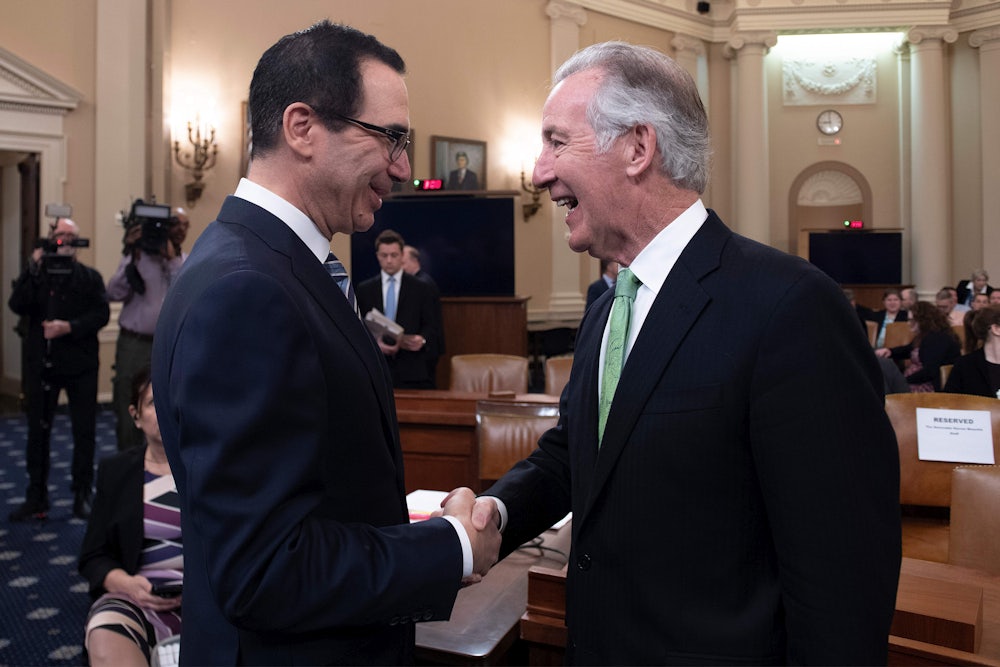In recent weeks, I’ve been trying to puzzle together how the Democrats’ midterm elections strategy can square with the complicated set of legislative maneuvers the party has to pull off in a few weeks’ time. The central conundrum is this: Democrats want to run a messaging campaign all next year highlighting the popular components of the Biden agenda—yet that agenda hasn’t been passed, and one of the two bills with the best chance of carrying it out—the budget reconciliation package—keeps getting watered down.
Those making big plans to sell the Democrats in next year’s midterms may want to make sure legislators haven’t already cashed someone else’s checks. It’s becoming increasingly clear that the moderates who have been steadily whittling down the Biden agenda are doing so at the behest of lobbyists and corporate interests, who are powerful enough to alter the legislative agenda but cannot actually guarantee enough voters will keep the party in power after the damage is done.
We should recall that there are stark choices that need to be made. For the Democrats’ midterm plan to work, something resembling President Biden’s popular agenda actually needs to pass. As certain Senate Democrats (looking at you, Kyrsten Sinema and Joe Manchin) refuse to part with the filibuster, once the budget reconciliation bill and the bipartisan infrastructure deal get enacted, our lawmakers’ lawmaking duties will in all likelihood be done for a number of years. So there really is no Plan B: The only things that Democrats will be able to brag about for the next two elections are in these measures.
The good news is that the budget reconciliation bill is very popular with the public. The bad news is that some Democrats appear allergic to its most popular provisions. As The New York Times’ David Leonhardt and Ian Prasad Philbrick recently wrote, this aversion extends to “government action to reduce drug prices,” several tax hikes on wealthy earners, and a “proposed expansion of Medicare to include dental, hearing and vision coverage.”
Elsewhere, Reuters’ Jarrett Renshaw reported that while the “$3.5 trillion Biden proposal outlined earlier this year included free community college, expanded child tax credits and universal preschool for any U.S. citizen,” Democrats are now hard at work adding means tests and eligibility caps, sacrificing universality for the sake of satisfying budget hawks.
And, as The Week’s Ryan Cooper documented at length, a similar effort is underway for the Family Act—a simple, straightforward, and universal parental family leave measure that would “provide 12 weeks of paid leave per year for new parents, people caring for family members, or people with serious illness.” Thanks to Representative Richard Neal, the chair of the Ways and Means Committee, the original bill has become “mangled … beyond recognition” into a means-tested “nightmare of complexity” that will force families to jump through unnecessary hoops, and exclude some of the most needful families from vastly diminished benefits.
When you consider the fact that Democrats are also not likely to fully renew the wildly popular expansion of the child tax credit, the Biden agenda’s already worrying trajectory appears to have worsened considerably in a short amount of time. As Leonhardt and Philbrick note, the “well-financed, well-organized lobbying groups strongly oppose some of the bill’s major provisions,” and are a major driver of this trend. Cooper’s analysis of the state of play over the Family Act broadly reaches the same conclusion: “Some insurance companies already offer private paid leave plans, and they’ve been donating hand over fist to most Ways and Means Democrats for years, Neal included. They want a piece of the action.”
This dynamic should receive more media attention. Throughout the past few weeks, the Beltway press has focused on the intraparty tensions between a progressive coalition that’s made a lot of concessions but continues to support a bill that’s popular with the public and stands to do some material good and a more conservative faction of moderates who have been hostile to the Biden agenda. This conflict has been largely framed as a clash of competing philosophies: profligate spenders versus miserly austerians.
It’s well past time, of course, to end the practice of blindly lending legitimacy to the positions of deficit hawks. But that’s grist for another mill. What’s important to note here is that the moderates aren’t actually coming by their ideological imperatives in an honest manner. If the media wants to continue covering these internecine conflicts, they might do well to remember that only one side is acting out of principle. The other has been bought off.
This article first appeared in Power Mad, a weekly TNR newsletter authored by deputy editor Jason Linkins. Sign up here.








